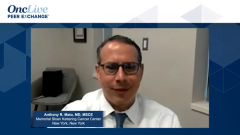
BTK Inhibitors in Relapsed/Refractory MCL and Treatment Selection
Panelists discuss treatment considerations in the use of BTK inhibitors for relapsed/refractory mantle cell lymphoma, with Matthew S. Davids, MD, MMSc, reviewing strategies for the management of AEs.
Episodes in this series

Anthony R. Mato, MD, MSCE: I want Brian and then Michael to weigh in on a different topic now. In CLL (chronic lymphocytic leukemia), and mantle cell lymphoma (MCL), I would say [that] we live in the world where there's the battle of the BTK (Bruton tyrosine kinase) inhibitors. MCL is even more confusing because there [are] 3 that are approved, to my knowledge. Brian, let's talk about the relapsed/refractory setting. We won't get controversial [by] talking about using them [in the] frontline [setting] since none of them are approved there, but [in the] relapsed/refractory setting, how are we supposed to decide between ibrutinib, zanubrutinib, [and] acalabrutinib? Michael, I want to hear your take on that as well.
Brian T. Hill, MD, PhD: Clearly, this group of medications has been transformative for the treatment of MCL and has higher response rates and activities than any other class of drug in the relapsed setting. The original trial of ibrutinib had a median progression free survival (PFS) of only about 2 years in the relapsed setting. Maybe it was 18 to 24 months [or] somewhere in that range, but it was much shorter than what we see in CLL. It seems as if it doesn't really maintain forever the way it does in patients [with] CLL.
Since the ibrutinib approval, as you pointed out, there have been 2 additional BTK inhibitors approved for MCL. In chronological order, the next one was acalabrutinib followed by zanubrutinib. In those studies, the median PFS was longer, but I would point out that the median prior lines of therapy in the single-arm, phase 2 trials of acalabrutinib and zanubrutinib, the patients were less heavily pretreated than they were in the ibrutinib study. In randomized trials in CLL, [when compared] head-to-head with ibrutinib, we know that there [are] lower rates of cardiovascular toxicities, atrial fibrillation and hypertension with acalabrutinib and with zanubrutinib. And these agents are very active in MCL, [so] my preference would be to start with one of the second-generation [agents] in patients [with] relapsed MCL: acalabrutinib or zanubrutinib.
Anthony R. Mato, MD, MSCE: Michael, should anyone be getting ibrutinib at this point?
Michael Wang, MD: No. Because of my involvement in BTK inhibitors in MCL, people ask me all the time, “Which one is the right agent?” Basically, there's no straight answer. We know, like Dr. Hill said, [that the trial of] ibrutinib was [with] 3 prior lines of therapy, acalabrutinib was [with 2] prior lines of therapy, and ibrutinib was 1.5 lines of prior therapy. If you have less prior therapy, of course the response rate is higher. In the randomized studies in Waldenstrom [macroglobulinemia] and CLL, you guys know [that] the efficacy was not studied [in relation to] the difference among the 3. [Regarding] the difference that comes from toxicities, [for] ibrutinib, infection [and] atrial fibrillation [are] the highest, [and] the other 2 are lower. Acalabrutinib caused headache, and sometimes it could be as severe as that, [which is] unique to acalabrutinib. Then ibrutinib, among the 3, has the most neutropenia. You have to individualize the [treatment for each] patient. What is most important [for] that? We are academic physicians. We have to practice according to existing data.
If, for example, you want to use ibrutinib with venetoclax [because] there's synergy, there [are] ongoing randomized trials, [so] you're welcome to because it's already published in the New England Journal of Medicine by Dr. Cunningham. Can you use acalabrutinib with venetoclax? No, there is no such data. There [are] data coming up from my center with a phase 2 study with the 2; the results so far are not very exciting. And can you use zanubrutinib with venetoclax? Not yet because the data is not there. I think we should practice according to the data we have, and then add in our individualized vision of patients.
Anthony R. Mato, MD, MSCE: Alexey, quick question for you then. Forgetting about which BTK inhibitor we choose, in the relapsed/refractory setting, is standard of care in your practice monotherapy, or do you combine them with CD20[-targeting agents]?
Alexey V. Danilov, MD, PhD: In my practice, I still use monotherapy BTK inhibition in MCL. As you know, they can't be compared head-to-head. The data with combination is still very limited, particularly in the relapsed setting. I guess I tend to transfer some of the CLL data where adding CD20 to ibrutinib has not necessarily improved outcomes in terms of PFS, so I use monotherapy.
Anthony R. Mato, MD, MSCE: Matt, you've heard a couple of comments now about the AE (adverse event) profile associated with the BTK inhibitors. It's not unique to MCL, but with whichever disease, can you list [the] top 3 AEs that are an issue in your practice? Any specific tips you have for management? This doesn't have to be MCL; we'll cover this now for CLL and MCL.
Matthew S. Davids, MD, MMSc: Generally, some of the more common things we see are cardiovascular toxicities, particularly hypertension and atrial fibrillation. These do occur more commonly with ibrutinib compared to either acalabrutinib or zanubrutinib from the head-to-head studies. Of course, bleeding risks are also there. We see minor bleeding, which can include bruising in probably up to half of patients. Again, [there are] higher rates with ibrutinib compared to acalabrutinib from the ELEVATE-RR study (NCT02477696) in CLL. The rates of major bleeding are relatively low with BTK inhibitors, but they do seem to be more equivalent across these 3 drugs in the range of about 5%, so we do need to monitor patients for that. There [are] a variety of other nuisance AEs that we commonly deal with: things like arthralgias, myalgias, and fatigue.
Some tips and tricks there can include dose adjustments [or] dose reductions, especially with ibrutinib. [These] can be helpful sometimes, [as can] supportive care measures [with] NSAIDs (non-steroidal anti-inflammatory drugs), [acetominophen], or even prednisone has sometimes been helpful at low doses for the arthralgias. These drugs, as we've been discussing, are different. Sometimes just switching to a different BTK inhibitor can be helpful. If you're starting a patient on acalabrutinib and they're really struggling with headaches and you're not able to get them through it, you can switch to ibrutinib or zanubrutinib, and you may have some resolution of that toxicity.
Transcript has been edited for clarity.







































